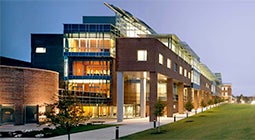CBIS serves as the hub of biotechnology-based research at Rensselaer. Our investigators collaborate across disciplines with the following:
Rensselaer Research Centers
- Biomedical Imaging Center (BIC)
- Rensselaer Center for Stem Cell Research
- Center for Architecture Science and Ecology
- Manufacturing Innovation Center
- Center for Computational Innovations
- Center for Materials, Devices, and Integrated Systems
- Experimental Media, & Performing Arts Center
- Darrin Freshwater Institute
- Future of Computing Institute
- Lighting Research Center
- Lighting Enabled Systems & Engineering
- Center for Modeling, Simulation, & Imaging in Medicine
- Center for Engineering and Precision Medicine
NYS Capital Region Innovation Corp (I-Corps) Site Program
The National Science Foundation’s Innovation Corps (I-Corps™) program uses experiential education to help researchers gain valuable insight into entrepreneurship, starting a business or industry requirements and challenges. The New York's Capital Region I-Corps Site program is for undergraduate students, graduate students, faculty, and staff from capital region colleges and universities. Teams start with research-based concepts and use interviews with potential customers and the business model canvas to understand the potential of launching a startup. Site team ideas or projects can originate from student work, research (funded or unfunded), institutional, or industrial projects. The topical focus of a project can be (but not limited to) medical devices, mobile applications, software, physical products, internet of things, social startups, hardware, wearables, etc.
